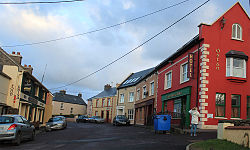Baile an Fheirtéaraigh (Irish, meaning 'Ferriter's Townland' [ˈbˠalʲ ənʲ ɛɾʲˈtʲeːɾˠiː]) unofficially anglicised as Ballyferriter, or also known as An Buailtín,[1] is a Gaeltacht village in County Kerry, Ireland. It is in the west of the Corca Dhuibhne (Dingle) peninsula and according to the 2002 census, about 75% of the town's population speak the Irish language on a daily basis. The village is named after the Norman-Irish Feiritéar family who settled in Ard na Caithne in the late medieval period. The last Chief of the Name was the seventeenth-century Bard and leader Piaras Feiritéar who was executed. The older Irish name for the village An B[h]uailtín ("the little dairy place") is still used locally.
Baile an Fheirtéaraigh
Ballyferriter | |
|---|---|
Village | |
 Ballyferriter, County Kerry, Ireland | |
| Coordinates: 52°10′31″N 10°24′50″W / 52.175195°N 10.414009°W | |
| Country | Ireland |
| Province | Munster |
| County | County Kerry |
| Government | |
| • Dáil Éireann | Kerry |
| Irish Grid Reference | Q352044 |
| As this is a Gaeltacht, Baile an Fheirtéaraigh is the only official name.[1][2] | |
The village lies at the base of Croaghmarhin Hill near Cuan Ard na Caithne (formerly also called Smerwick Harbour) on the Dingle Peninsula, on the R559 regional road which loops around the west of the peninsula, beginning and ending in Dingle Town. It has three pubs and one hotel. It also has a school, church, museum, Músaem Chorca Dhuibhne,[3] the offices of the local co-op (Comharchumann Forbartha Chorca Dhuibhne[4]) and a Garda station.[citation needed]

The village is busier throughout the summer due to an influx of Irish students, when both teenagers and adults attend Irish language courses in the local national school and other venues in the village as part of the local Irish colleges. University College Cork also owns a house there that facilitates a year-long study course for students at a higher level.[5]
Between Ballyferriter and Smerwick Harbour is Dún an Óir (the Fort of Gold), an Iron Age promontory fort, which was the location of the Siege of Smerwick, a massacre in 1580. A 600-strong Spanish and Italian papal invasion force which had come as part of the Second Desmond Rebellion of James Fitzmaurice Fitzgerald were besieged and massacred by the English crown forces of Arthur Grey, 14th Baron Grey de Wilton.[citation needed]
Under a place-names order in 2004, the Minister for the Gaeltacht, Éamon Ó Cuív declared that the Irish place-name (Baile an Fheirtéaraigh) must be used on maps and signage.[2]
References
edit- ^ a b "Baile an Fheirtéaraigh / Ballyferriter". logainm.ie. Placenames Database of Ireland. Retrieved 31 August 2022.
- ^ a b "An tOrdú Logainmneacha (Ceantair Ghaeltachta) 2004" (PDF). Government of Ireland.
- ^ "Dingle Peninsula Museum website". westkerrymuseum.com.
- ^ "Comharchumann Forbartha Chorca Dhuibhne Teo, Corca Dhuibhne, Daingean, West Kerry". www.cfcd.ie. Retrieved 25 August 2020.
- ^ "Dún Chíomháin". University College Cork. Retrieved 2 November 2023.
